By Esha Chaudhuri
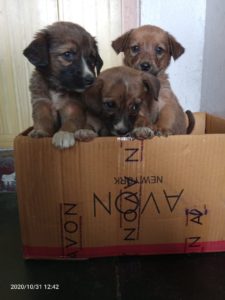
Even though our four-legged friends hold a sacred space in our hearts, especially for all animal lovers, incidents of animal cruelty reported have been monumental and are witnessing an unprecedented rise over the years. In this week’s story, Sunday Shillong presents stories from the underbellies of the city narrated by FurryTales, Shillong’s Happy Tails and Humans United For Animals and Nature (HUFAN), that ring up the curtain on issues of animal torture and abuse.
Muted cruelties
Misconceptions and fallacies regarding animals must be debunked. In a relentless pursuit, organisations like FurryTales, Happy Tails and HUFAN, all founded in 2020, labour to bring injustices on animals to the fore while conducting adoption and 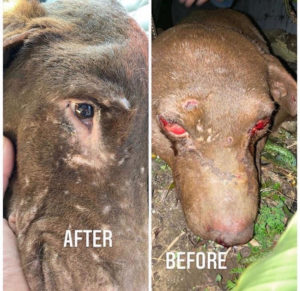 sponsorship drives by setting an example for others to follow suit through their work showcasing humane qualities towards our furry friends.
sponsorship drives by setting an example for others to follow suit through their work showcasing humane qualities towards our furry friends.
What has been a common revelation among all, however, has been the discrete selling and buying of dog and cat meat.
Recounting an incident, President of HUFAN, Zain Nongrum narrates, “On September 27, 2020 our team received information that some people were consuming dog meat in Happy Valley, Shillong. 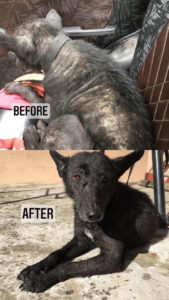 Accordingly, the team responded and went to the place to verify. Upon reaching the location, we saw in front of our own eyes a mutilated, burnt and tortured dead body of a dog. The sight of such gruesomeness is unbearable to any living being. Information was provided to the police for further investigation, after which it was discovered that there are several slaughterhouses in the area where evidence of commission of such acts have been seen by our volunteers.” Members of HUFAN then engaged with the people involved, informing them of the consequences of their actions and even received assurance from them that they will not indulge in such acts again.”
Accordingly, the team responded and went to the place to verify. Upon reaching the location, we saw in front of our own eyes a mutilated, burnt and tortured dead body of a dog. The sight of such gruesomeness is unbearable to any living being. Information was provided to the police for further investigation, after which it was discovered that there are several slaughterhouses in the area where evidence of commission of such acts have been seen by our volunteers.” Members of HUFAN then engaged with the people involved, informing them of the consequences of their actions and even received assurance from them that they will not indulge in such acts again.”
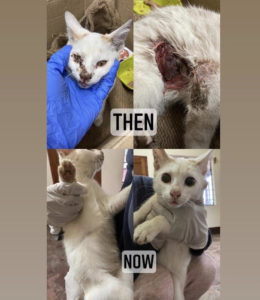 Similarly, co-founder and member at FurryTales, Diangtihun Kharkongor and Diangti Lyngdoh also inform, “There was this case of one Kalu who had almost been a victim of dog meat trade. His owners had been extremely unreasonable and were not willing to negotiate terms. If it had not been for the quick actions of the members who had woken up as early as five in the morning to rescue him, he would have been given up for meat consumption.”
Similarly, co-founder and member at FurryTales, Diangtihun Kharkongor and Diangti Lyngdoh also inform, “There was this case of one Kalu who had almost been a victim of dog meat trade. His owners had been extremely unreasonable and were not willing to negotiate terms. If it had not been for the quick actions of the members who had woken up as early as five in the morning to rescue him, he would have been given up for meat consumption.”
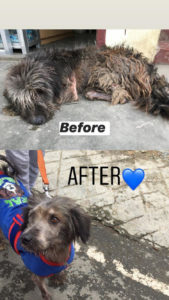 Expressing disappointment, co-founder at Shillong Happy Tails, Vanisha Wahlang says, “ It’s really sad to say that dog meat trade is prevalent in our state, where we as a team have come across people caught selling and buying dog meat. There were even instances where dogs were being trafficked from our state to another for the same purpose.”
Expressing disappointment, co-founder at Shillong Happy Tails, Vanisha Wahlang says, “ It’s really sad to say that dog meat trade is prevalent in our state, where we as a team have come across people caught selling and buying dog meat. There were even instances where dogs were being trafficked from our state to another for the same purpose.”
The other co-founder and sister of Vanisha, Sheetal Wahlang states, “Our team has conducted awareness campaigns to educate people about the laws against animal cruelty and the illegal dog meat trade.” Pressing for authoritative intervention, Wahlang says, “It can be discouraging since despite our efforts, instances of dog meat trade are 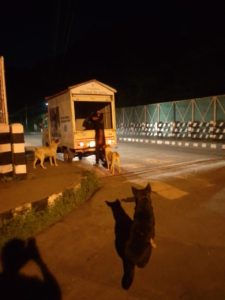 still going on in the state. Slaughter of stray animals, such as dogs, is not the right way to curb an increase in their population. Municipal bodies should be responsible in conducting sterilisation drives and getting a permanent solution to the increase in the number of strays in the city.”
still going on in the state. Slaughter of stray animals, such as dogs, is not the right way to curb an increase in their population. Municipal bodies should be responsible in conducting sterilisation drives and getting a permanent solution to the increase in the number of strays in the city.”
Concurring with Diangti, Nongrum adds, “Consumption of cat and dog meat is associated with several superstitions and we are trying our best to educate people so that in the name of 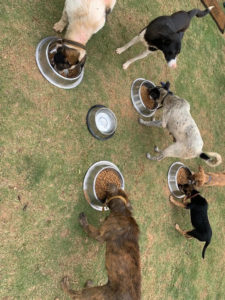 beliefs, helpless animals are not killed or consumed.” Besides HUFAN’s notable work, they also raise awareness on the notion of pain that is universally felt across all living beings so as to deter people from harming them.
beliefs, helpless animals are not killed or consumed.” Besides HUFAN’s notable work, they also raise awareness on the notion of pain that is universally felt across all living beings so as to deter people from harming them.
Not limited to meat trade alone, and taking notice of other forms of atrocities, Diangti observes, “The case of a dog named Mojo was that of extreme ignorance and neglect on the part of the owners. Mojo had grown up bound by a chain for
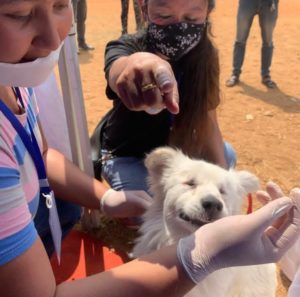
thirteen years. He had become very aggressive and dangerous and when he, quite obviously, bit people, the owners threatened to kill him or give him away.” This was followed by a rescue operation but the emotional trauma of interacting with humans continues to persist in Mojo, making it difficult for FurryTales to find him a home. Diangti surmises, “The inconsiderate actions of the owners have left the team with the strong urge to raise awareness amongst pet owners of on the severity of the punishment given if they are found guilty of

abusing their pets.”
Citing another case of intentional mistreatment, Diangti shares, “In a more recent and perhaps the most appalling one was a case in Rynjah where we had received a call regarding a trapped dog. The dog himself was a stray. What was most disgusting about 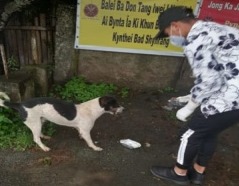 this particular case was that the people who had come to capture the dog were in the guise of being NGO members and proceeded to fool the neighbors and the owners alike by saying that they were going to help the dogs by relocating them. They instead trapped the poor dog with a steel wire tied
this particular case was that the people who had come to capture the dog were in the guise of being NGO members and proceeded to fool the neighbors and the owners alike by saying that they were going to help the dogs by relocating them. They instead trapped the poor dog with a steel wire tied
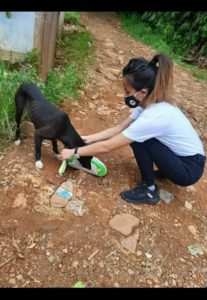
around his neck, strangling the poor creature. What was worse was that they had managed to take away four more dogs before we intervened. We were unable to catch the culprits but we were able to save the dog.”
Making observations, Vanisha says, “Inflicting brutality on helpless beings is only an outcome of a regressive mindset or a lack of education. Also, due to the weak laws, attacks directed on innocent animals have more than doubled in the last few years.”
Debunking myths and superstitions
A way of life where assumed hierarchies replicating people’s daily values of living and extending those values to the animal kingdom 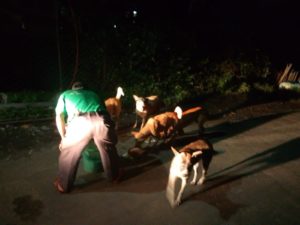 needs a massive rethink. Often, intentional acts of cruelty are appendages of our preconceived notions and microscopically orchestrated through age-old superstitions using them as currency to inflict pain and torture on many four-legged beings.
needs a massive rethink. Often, intentional acts of cruelty are appendages of our preconceived notions and microscopically orchestrated through age-old superstitions using them as currency to inflict pain and torture on many four-legged beings.
On behalf of FurryTales, Diangti explicates the common misjudgment on the issue of strays, “One 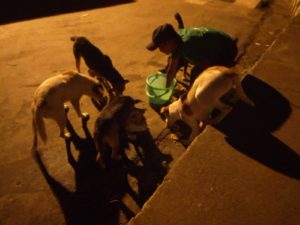 common superstitious belief that many think is that street dogs are dangerous and that one should not be approached by them. This is a common misconception spread by those who have had a bad experience with street dogs. In our experience, they only behave badly and become dangerous if they are mistreated and so it is very important to treat them well so they too will respond accordingly, because, in many bite cases, the dogs do not bite out of spite but out of fear.”
common superstitious belief that many think is that street dogs are dangerous and that one should not be approached by them. This is a common misconception spread by those who have had a bad experience with street dogs. In our experience, they only behave badly and become dangerous if they are mistreated and so it is very important to treat them well so they too will respond accordingly, because, in many bite cases, the dogs do not bite out of spite but out of fear.”
Highlighting another serious matter on sex preference and discrimination, Diangti says,
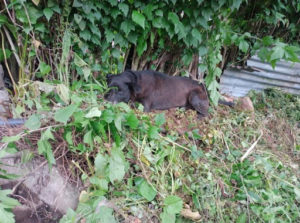
“A misconception that we have come to hear about is that female dogs are dirtier than male dogs. This is untrue. Male dogs and female dogs are the same aside from the fact that female dogs give birth. If properly cared for and neutered on time, male and female dogs have no difference whatsoever.” For the best interests of all, as a community, Kharkongor’s FurryTales encourages the public to adopt females too.
Breeding versus Adoption
It is the common notion that breeders do what they do based solely on moneymaking motives. Conscientious team chiefs of these Shillong-based organisations unanimously agree 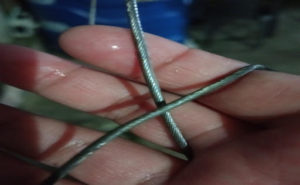 that adoption is a conscious and sustainable choice, giving animals a wider possibility of a happy life breaking free from the clutches of breeders. Diangti says, “We at FurryTales do not support the idea of buying and selling dogs. We encourage adoption as a better choice as we have heard many times about breeders who over-breed dogs for profits. So far, we have not come across any adopters that are adopting these animals for bad intentions. Over-breeding and abuse of these animals should be seen as a punishable crime.”
that adoption is a conscious and sustainable choice, giving animals a wider possibility of a happy life breaking free from the clutches of breeders. Diangti says, “We at FurryTales do not support the idea of buying and selling dogs. We encourage adoption as a better choice as we have heard many times about breeders who over-breed dogs for profits. So far, we have not come across any adopters that are adopting these animals for bad intentions. Over-breeding and abuse of these animals should be seen as a punishable crime.”
Additionally, Vanisha highlights, “When you buy a dog from a pet store, you might be supporting a puppy mill. Many animals sold in pet stores come from puppy mills. These are 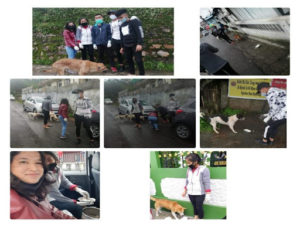 mass breeding facilities that pack animals into cramped, filthy cages and breed female dogs over and over again until they are unable to continue having babies. They are sold as commodities, kept in unsuitable conditions and abandoned or left to die when they are no longer useful.”
mass breeding facilities that pack animals into cramped, filthy cages and breed female dogs over and over again until they are unable to continue having babies. They are sold as commodities, kept in unsuitable conditions and abandoned or left to die when they are no longer useful.”
Hence, ‘Adopt don’t shop’ has been the slogan by many animal activists for the very same reason.
Not all hope lost

Like the balance of nature, while there are those that live a blissful life of ignorance and apathy, there also exist good Samaritans that believe in just acts. The works of Team Jiva and Stray Animal Rescue Society, Shillong (SARS) who feed stray animals, particularly dogs on the streets, exemplifies this. “We feed the street dogs at night because we feel for them. We don’t 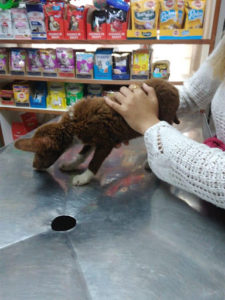 want them to sleep hungry”, says Managing Director of Jiva Hospitality of India Limited, Jiwat Vaswani. Team Jiva has been a proactive one at beautifying the city of Shillong as well enforcing other socially responsible projects of cleaning and making Shillong green.
want them to sleep hungry”, says Managing Director of Jiva Hospitality of India Limited, Jiwat Vaswani. Team Jiva has been a proactive one at beautifying the city of Shillong as well enforcing other socially responsible projects of cleaning and making Shillong green.
In similar fashion, SARS, existent since 2016 has been dedicated on towards issues related to animal cruelty such as dog meat trade, cases of and abandonment, accidents, as well as sterilisation and adoption of the stray puppies. They too, began a feeding drive during the COVID-19 lockdowns of 2020 and 2021. “During the two lockdowns, we fed around 50 dogs from different locations in Shillong from the online donations of our patrons and other animal lovers online”, shares Tee Mawlong co-founder of Stray Animal Rescue Society, Shillong.
Illuminating on the process of procuring and distributing food, Mawlong says, “Our members
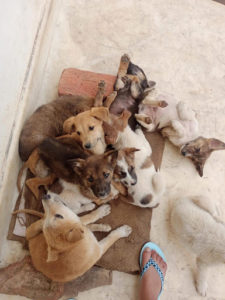
would purchase rice and meat and we would cook in our houses after which one of the group members would sponsor a vehicle and then we would go to different locations. We’d use disposable papers to feed them and then wait till they’d finish and then clean up.”
Even though with the lifting of lockdowns, SARS has stopped feeding strays on the street essentially because food shops and meat vendors distribute leftovers, it continues with its other projects related to animal welfare.
In a strife to make the world paw-some by treating strays including dogs and cats as part of society, the words of Mahatma Gandhi resounds immensely as he said that “The greatness of a nation can be judged by the way its animals are treated.”



